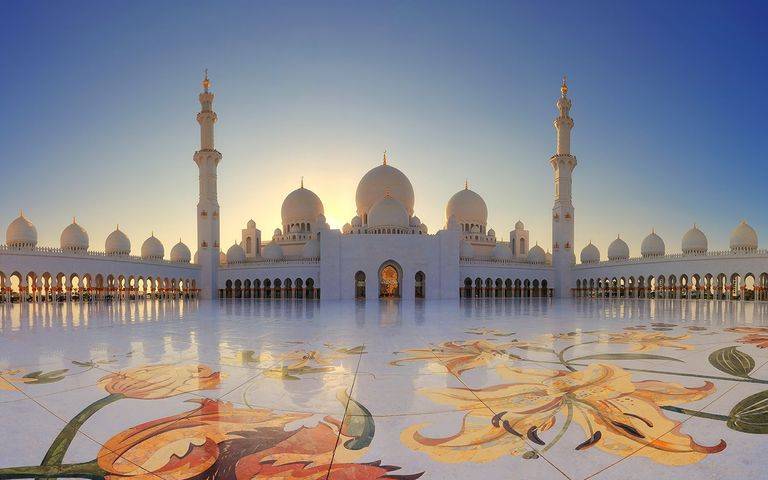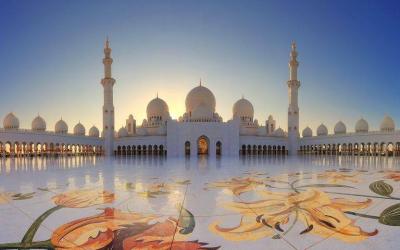The mosques in the United Arab Emirates embody an inspiring model of green, eco-friendly buildings and serve as a starting point for enhancing the adoption of sustainable solutions in the future. The UAE stands out as one of the leading countries in keeping pace with developments in building sustainability, including mosques, thanks to various governmental initiatives aimed at rooting sustainability in various development, service, and housing projects. The goal is to improve quality of life and achieve carbon neutrality.
The following report showcases several mosques in the UAE that were pioneers globally in adopting renewable energy solutions and sustainable building standards. In January, Masdar City opened the "Sustainability Mosque," which exemplifies a commitment to the highest international sustainability standards. Its design incorporates passive design concepts, an architectural technique that maximizes energy and water efficiency.
Traditional Arabic designs like mashrabiya and light wells play a significant role in increasing natural light while reducing heat from direct sunlight. The airtight envelope around the building provides high-performance insulation, complemented by the shaded tree walkways and intelligent sensors inside the mosque that allow for precise management of lighting and ventilation, all of which reduce the need for energy-intensive cooling. The photovoltaic solar panels installed on the nearby parking shade structures produce a portion of the building's remaining energy requirements.
The unique design of the mosque meets all requirements to be the first LEED Platinum mosque in Abu Dhabi and is on track to receive three pearls according to the Pearl Rating System for buildings "PBRS". The Sharjah Public Works Department announced during its participation in the UN Climate Change Conference "COP28" an initiative to create two eco-friendly mosques operating on radiant cooling systems and energy-efficient design, also providing spatial comfort.
The two mosques will utilize air beam cooling systems, allowing for a reduction in carbon footprint and reducing electricity consumption by 14%, equivalent to eliminating 620 kilograms of carbon dioxide, and the building is classified at a silver rating.
In Dubai, Khalifa Al-Tajir Mosque, which opened in 2014, is the first eco-friendly mosque in the Islamic world, with its design aligned with the green building standards of the US Green Building Council (USGBC). The mosque employs renewable energy solutions, including outdoor lighting poles equipped with solar panels, a solar-powered battery storage system, and solar panels for heating ablution water and water used in the imam's residence and the mosque's facilities instead of electric heaters.
The eco-friendly solutions and technologies used in the mosque help reduce energy consumption by utilizing energy-efficient LED lighting instead of regular bulbs and implementing an automatic lighting control system based on prayer times. Additionally, modern technologies control the water flow rate for taps in the ablution area and sinks, along with water treatment and filtration by collecting used ablution water for reuse in restrooms and irrigation of plants. Other solutions employed in the mosque include thermal insulation using insulating materials for ceilings and external walls to minimize heat transfer, and double-glazed windows with a metallic coating that reduces the amount of sunlight entering the mosque.
Al-Rayan Mosque, built in the Hatta area, is the first mosque in the world to receive the platinum classification for green buildings, covering an area of 1,050 square meters and accommodating around 600 worshippers. The mosque, which opened in 2021 after 12 months of construction, features charging stations for electric vehicles in the parking area, and used ablution water is reused for irrigating green areas. The ventilation and cooling systems in the mosque contribute to reducing energy consumption, and the mosque's design, along with solar panels, reduces energy use by 25%.
In Ras Al Khaimah, Al-Sabtain Mosque is the first smart and green mosque in the emirate designed and built with environmentally friendly materials according to UAE and international standards. Surrounding the mosque are diverse green spaces that help cool the environment and enhance the surrounding area. It is equipped with a water recycling system for used water, which is utilized in agricultural irrigation.
The mosque's lighting operates on solar energy, controlled by special sensors, while air conditioning employs an intelligent system that regulates the cooling of the mosque based on summer and winter temperatures. Additionally, water in the tanks is temperature-controlled using solar energy to align with the seasons. Smart sensors in the ablution area help prevent water waste and facilitate the harvesting of rainwater after mechanical purification for use in ablution and irrigation of green spaces.




